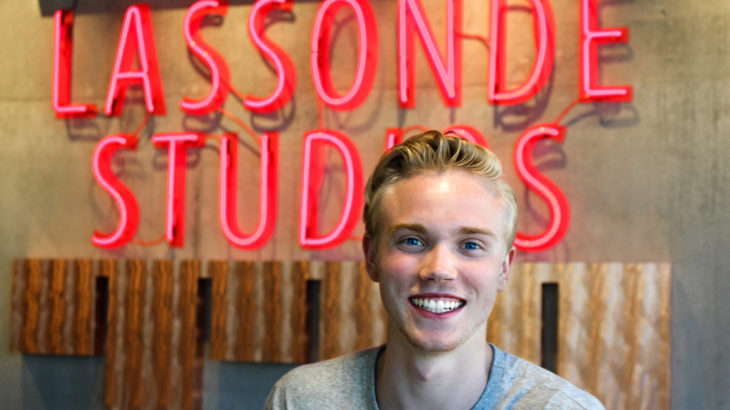When Logan Erickson was a sophomore at the University of Utah, he thought he had his career plan figured out. Erickson was pursuing an Entertainment Arts & Engineering degree with a minor in computer science, and found success in social issue-based game development, with the release of Justice.exe.
Neuroscience wasn’t really on his radar until the following semester, when Erickson landed in a neurosculpting class. Here, he identified some key links between his passion for games and for education.
“It completely changed my life,” he said. “The idea that you can rewrite neural pathways, learn better and make better decisions. This realization totally got me out of my rut. I wanted to find out how this knowledge could be integrated with games, implemented on a wide scale.”
Through some lucky networking connections, and the persistent advice of his parents to follow his interests, Erickson met Dr. Michael Merzenich, “the father of neuroplasticity,” the director of an Australian not-for-profit organization, Stronger Brains, and founding member of Posit Science, the creators of the popular and research backed brain training platform, BrainHQ.
At the time, Stronger Brains was delivering brain training via BrainHQ to children in Australia and England. Their goals were the same: to leverage the power of neuroplasticity and help students improve academic performance and personal wellness. However, there was a vision to build out a platform and implement their work in the United States. It was a culmination of all Erickson’s interests, and when he was invited to move out to San Francisco and intern, he jumped on it.
“The team was amazing, and I was invited to do real work right away with members from Stronger Brains and Posit Science,” he said.
After a summer of interning, Erickson continued to work with his team to prepare for an upcoming trial in the spring. As the new year rolled around, he was offered a deal to be a founding member, overseeing the design and development of the for-profit version of Stronger Brains programs in the U.S. He readily accepted and got back to work.
“We incorporate social and emotional learning to train your brain,” said Erickson, who worked with the Lassonde Entrepreneur Institute for support in developing Justice.exe through the University of Utah Honors College, and other games, through his game studio Octothorpe.
“It’s built on the concept of neuroplasticity – the idea that you can change your brain for the better. I believe strongly in the concept of a growth mindset, and that’s what we focus on here, getting students to be intrinsically motivated,” he said.
Stronger Brains assesses a child’s learning capacity, and outlines their strengths and weaknesses, through a series of short gamified assessments. Then, the program reviews their scores in five areas: executive control, focus and attention, processing speed, social cognition, and working memory. Currently, the brain training via BrainHQ constantly adapts to a child’s ability so that each of the five are boosted. Soon we intend to leverage results from pre-assessments to tailor the “brain training” games included in the course for even greater effect and personalization.
“I really wanted to help kids. I know it sounds cliché, but it’s true,” he said. “I found it so absurd that we have these problems in the educational system, where students aren’t able to be served at their individual learning levels, where students are stopped by learning roadblocks. There doesn’t seem to be dedication to learning about the brain. It’s like if you were trying to teach someone how to drive, but not allowing them to use the steering wheel.”
One of the most compelling parts of Stronger Brains to Erickson is how the product scales and adapts. When the COVID-19 pandemic struck, Stronger Brains wasn’t derailed – it found a piece of the market where it could shine even brighter.
“Stronger Brains can be used in the academic space and at home,” Erickson said. “We were focusing on the school systems, helping teachers and students track brain development and understand students’ learning processes, and then the schools closed.”
All of a sudden, the U.S., and countries world-wide, were faced with a new challenge: kids were back at home, all day.
“Parents were like ‘what do we do? How do we homeschool our kids, how do we handle this?’” he said. “And all we had to do to make our program interchangeable from the school setting to at-home was add a few more videos. That’s it, to pivot from at-school learning to distanced, at-home learning.”
Now, Stronger Brains is working to expand, delivering products to more school districts in preparation for reopenings this fall, and improving accessibility for students at-home, and Erickson is all-in.
“I got so much business experience while living and launching at Lassonde,” Erickson said. “I worked with so many different people on different projects, and put me in a business development and networking mindset that I needed to get to where I am now.”
And he raved about those who make it all possible, “I am so grateful for Troy’s continued support past my time at the U and Anne’s never-ending positivity. A big shout out to Jason, the chef, who fed me well for years and I absolutely adore.”
Learn more about Stronger brains at strongerbrains.com. Connect with Logan Erickson on LinkedIn here.




Great work by Logan Ericson. Thanks to Jacquline for sharing this post.